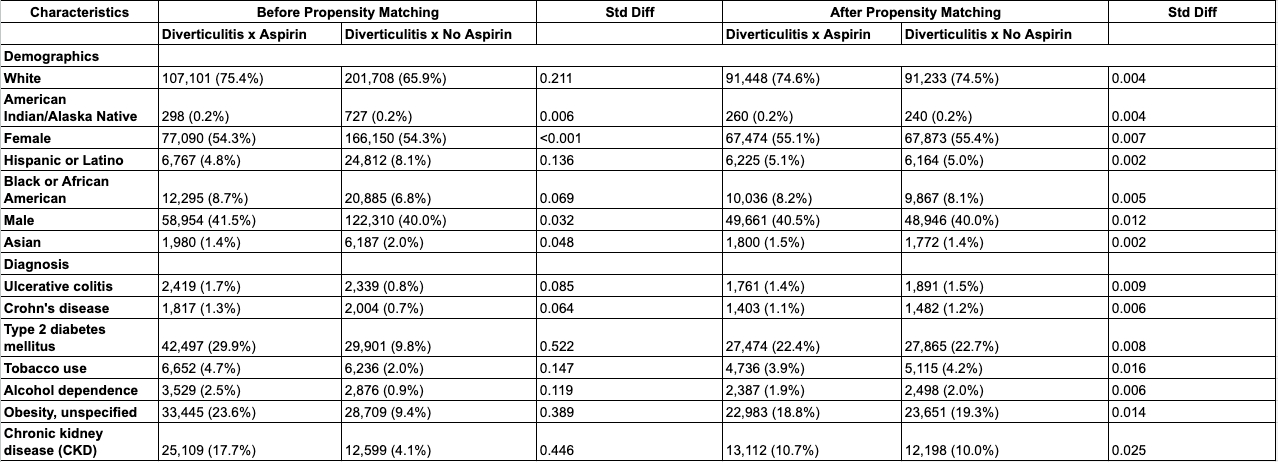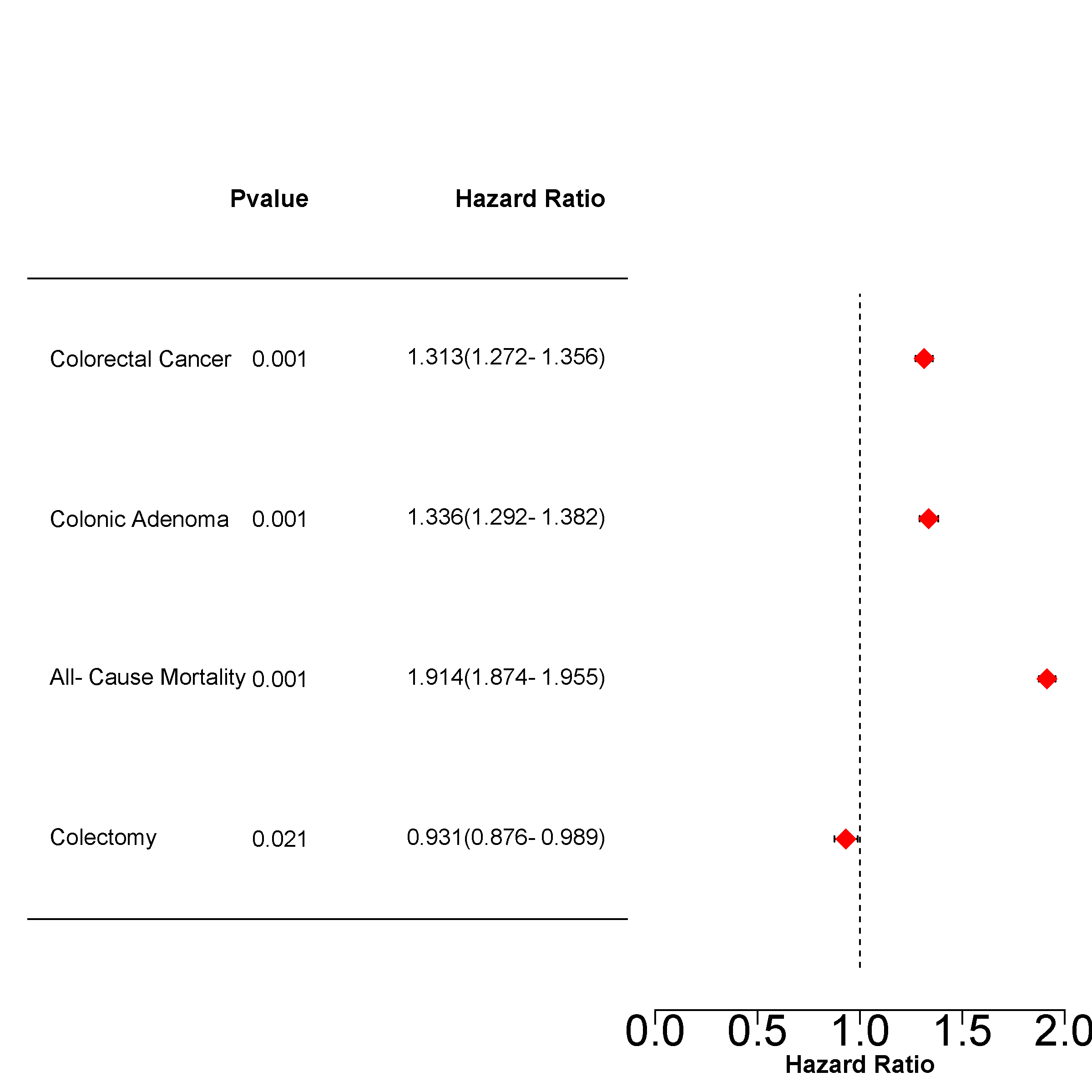Sunday Poster Session
Category: Colon
P0278 - Aspirin in Diverticulitis: A Hidden Risk? Uncovering Cancer and Mortality Dangers to Shape Future Guidelines
Sunday, October 26, 2025
3:30 PM - 7:00 PM PDT
Location: Exhibit Hall

Kojo-Frimpong Awuah, MD
Allegheny Health Network
Pittsburgh, PA
Presenting Author(s)
Kojo-Frimpong B. Awuah, MD1, Kriti Dhamija, MD1, Somtochukwu Onwuzo, MD2, Kingsley Ozongwu, MD1, Oyepeju Abioye, MD1, Tyrell Daniel, MD3, Chidera Onwuzo, MBBS4, Rashid Abdel-Razeq, MD5
1Allegheny Health Network, Pittsburgh, PA; 2Allegheny Center for Digestive Health, Pittsburgh, PA; 3Sentara Northern Virginia Medical Center, Pittsburgh, PA; 4SUNY Upstate Medical University Hospital, Syracuse, NY; 5Cleveland Clinic Foundation, Cleveland, OH
Introduction: Aspirin is commonly used for cardiovascular prevention, yet its impact on patients with diverticulitis remains under explored. Given emerging concerns about aspirin's risks in certain populations and the evolving guidelines around its use, this study aimed to evaluate whether aspirin use in patients with diverticulitis is associated with increased risk of colorectal cancer, colonic adenoma, all-cause mortality, and need for colectomy.
Methods: We conducted a retrospective analysis of deidentified, aggregate patient data from the TriNetX research network. The cohort comprised patients ≥18 years old with a diagnosis of diverticulitis. Within this cohort, patients who were on aspirin with a diagnosis of diverticulitis were identified. Primary outcomes were the incidence of colorectal cancer, colonic adenoma, all-cause mortality, and the need for colectomy. Variables including age, sex, race, comorbidities (such as diabetes, obesity, and chronic kidney disease), and lifestyle factors (such as tobacco use and alcohol dependence) known to confound the association between aspirin use and the composite outcomes underwent 1:1 propensity matching. Cox proportional hazards regression analysis was also utilized to analyze the matched cohorts. Hazard ratios and 95% confidence intervals (95% CI) were reported in this analysis.
Results: The matched cohort analysis revealed that aspirin use was associated with a significantly higher risk of colorectal cancer (HR 1.313, 95% CI 1.272-1.356, p < 0.001), colonic adenoma (HR 1.336, 95% CI 1.292-1.382, p < 0.001), and all-cause mortality (HR 1.914, 95% CI 1.874-1.955, p < 0.001). However, a lower risk of requiring colectomy was observed among aspirin users (HR 0.931, 95% CI 0.876-0.989, p = 0.021).
Discussion: Our findings suggest that aspirin use in patients with diverticulitis is associated with significantly elevated risks of colorectal neoplasia and mortality, despite a modest reduction in colectomy rates. These results underscore the need to reconsider aspirin’s routine use in patients at risk for or diagnosed with diverticulitis. Given shifting guidelines that discourage aspirin for primary prevention in older adults, clinicians should carefully weigh the risks and benefits in this population. Further prospective studies are warranted to guide evidence-based recommendations.

Figure: Table 1: Baseline characteristics of diverticulitis patients with and without aspirin use before and after propensity score matching. Before matching, notable imbalances were observed between the groups in variables such as race, diabetes mellitus, obesity, and chronic kidney disease (CKD). After matching, standardized differences (Std Diff) for all variables were minimized, indicating improved balance between the aspirin and non-aspirin groups, thus reducing potential confounding in subsequent outcome analyses.

Figure: Figure 1: Forest plot showing the association between aspirin use in diverticulitis and the risk of adverse outcomes, including colorectal cancer, colonic adenoma, all-cause mortality, and need for colectomy. Hazard ratios (HR) with 95% confidence intervals are displayed, indicating a statistically significant increased risk for colorectal cancer (HR 1.313), colonic adenoma (HR 1.336), and all-cause mortality (HR 1.914) in aspirin users. Conversely, aspirin use is associated with a reduced risk of colectomy (HR 0.931).
Disclosures:
Kojo-Frimpong B. Awuah indicated no relevant financial relationships.
Kriti Dhamija indicated no relevant financial relationships.
Somtochukwu Onwuzo indicated no relevant financial relationships.
Kingsley Ozongwu indicated no relevant financial relationships.
Oyepeju Abioye indicated no relevant financial relationships.
Tyrell Daniel indicated no relevant financial relationships.
Chidera Onwuzo indicated no relevant financial relationships.
Rashid Abdel-Razeq indicated no relevant financial relationships.
Kojo-Frimpong B. Awuah, MD1, Kriti Dhamija, MD1, Somtochukwu Onwuzo, MD2, Kingsley Ozongwu, MD1, Oyepeju Abioye, MD1, Tyrell Daniel, MD3, Chidera Onwuzo, MBBS4, Rashid Abdel-Razeq, MD5. P0278 - Aspirin in Diverticulitis: A Hidden Risk? Uncovering Cancer and Mortality Dangers to Shape Future Guidelines, ACG 2025 Annual Scientific Meeting Abstracts. Phoenix, AZ: American College of Gastroenterology.
1Allegheny Health Network, Pittsburgh, PA; 2Allegheny Center for Digestive Health, Pittsburgh, PA; 3Sentara Northern Virginia Medical Center, Pittsburgh, PA; 4SUNY Upstate Medical University Hospital, Syracuse, NY; 5Cleveland Clinic Foundation, Cleveland, OH
Introduction: Aspirin is commonly used for cardiovascular prevention, yet its impact on patients with diverticulitis remains under explored. Given emerging concerns about aspirin's risks in certain populations and the evolving guidelines around its use, this study aimed to evaluate whether aspirin use in patients with diverticulitis is associated with increased risk of colorectal cancer, colonic adenoma, all-cause mortality, and need for colectomy.
Methods: We conducted a retrospective analysis of deidentified, aggregate patient data from the TriNetX research network. The cohort comprised patients ≥18 years old with a diagnosis of diverticulitis. Within this cohort, patients who were on aspirin with a diagnosis of diverticulitis were identified. Primary outcomes were the incidence of colorectal cancer, colonic adenoma, all-cause mortality, and the need for colectomy. Variables including age, sex, race, comorbidities (such as diabetes, obesity, and chronic kidney disease), and lifestyle factors (such as tobacco use and alcohol dependence) known to confound the association between aspirin use and the composite outcomes underwent 1:1 propensity matching. Cox proportional hazards regression analysis was also utilized to analyze the matched cohorts. Hazard ratios and 95% confidence intervals (95% CI) were reported in this analysis.
Results: The matched cohort analysis revealed that aspirin use was associated with a significantly higher risk of colorectal cancer (HR 1.313, 95% CI 1.272-1.356, p < 0.001), colonic adenoma (HR 1.336, 95% CI 1.292-1.382, p < 0.001), and all-cause mortality (HR 1.914, 95% CI 1.874-1.955, p < 0.001). However, a lower risk of requiring colectomy was observed among aspirin users (HR 0.931, 95% CI 0.876-0.989, p = 0.021).
Discussion: Our findings suggest that aspirin use in patients with diverticulitis is associated with significantly elevated risks of colorectal neoplasia and mortality, despite a modest reduction in colectomy rates. These results underscore the need to reconsider aspirin’s routine use in patients at risk for or diagnosed with diverticulitis. Given shifting guidelines that discourage aspirin for primary prevention in older adults, clinicians should carefully weigh the risks and benefits in this population. Further prospective studies are warranted to guide evidence-based recommendations.

Figure: Table 1: Baseline characteristics of diverticulitis patients with and without aspirin use before and after propensity score matching. Before matching, notable imbalances were observed between the groups in variables such as race, diabetes mellitus, obesity, and chronic kidney disease (CKD). After matching, standardized differences (Std Diff) for all variables were minimized, indicating improved balance between the aspirin and non-aspirin groups, thus reducing potential confounding in subsequent outcome analyses.

Figure: Figure 1: Forest plot showing the association between aspirin use in diverticulitis and the risk of adverse outcomes, including colorectal cancer, colonic adenoma, all-cause mortality, and need for colectomy. Hazard ratios (HR) with 95% confidence intervals are displayed, indicating a statistically significant increased risk for colorectal cancer (HR 1.313), colonic adenoma (HR 1.336), and all-cause mortality (HR 1.914) in aspirin users. Conversely, aspirin use is associated with a reduced risk of colectomy (HR 0.931).
Disclosures:
Kojo-Frimpong B. Awuah indicated no relevant financial relationships.
Kriti Dhamija indicated no relevant financial relationships.
Somtochukwu Onwuzo indicated no relevant financial relationships.
Kingsley Ozongwu indicated no relevant financial relationships.
Oyepeju Abioye indicated no relevant financial relationships.
Tyrell Daniel indicated no relevant financial relationships.
Chidera Onwuzo indicated no relevant financial relationships.
Rashid Abdel-Razeq indicated no relevant financial relationships.
Kojo-Frimpong B. Awuah, MD1, Kriti Dhamija, MD1, Somtochukwu Onwuzo, MD2, Kingsley Ozongwu, MD1, Oyepeju Abioye, MD1, Tyrell Daniel, MD3, Chidera Onwuzo, MBBS4, Rashid Abdel-Razeq, MD5. P0278 - Aspirin in Diverticulitis: A Hidden Risk? Uncovering Cancer and Mortality Dangers to Shape Future Guidelines, ACG 2025 Annual Scientific Meeting Abstracts. Phoenix, AZ: American College of Gastroenterology.
